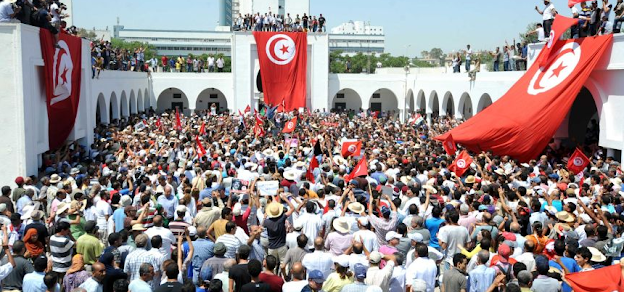''' '' HISTORIC EUREKA
HONOURS '' '''
A RECENT REPORT IN THE GUARDIAN quotes a roadside bread seller in the Tunisian hinterland, 60-year-old Aisha Querishi, as looking back on Ben Ali's ouster in these words:
''We won a little freedom. Under him we couldn't speak. But does this affect my life? I want freedom and dignity. Can't I have both?'' The direct or subtle response from most Middle East regimes would be a simple 'NO'.
The continuing tragedy across much of the region is that for large segments of the population neither freedom nor dignity is a viable option.
Historically, the unwritten compact between authoritarian regimes and their populations could occasionally be summed up as : keep quiet and your basic needs will be met.
That is generally unfeasible in the age of neoliberal capitalism. The lesson autocrats would like their subjects to draw from the Arab Spring is that resistance is futile.
KASHMIR DAY : THE WORLD STUDENTS SOCIETY - for every subject in the world - adorned silent mourning for the unending sufferings of the great people of Kashmir. Even greater challenges await us, but divine intervention will come.
MARK MY WORDS : Freedom, dignity, pride and happiness and all opportunities will come to the people and the children of Kashmir, from the honors and blessings of Almighty God.
Freedom will come to the Kashmiris, when India's great sons and daughters like, Amitabh Bachan, Sunil Gavasker, Kapil Sharma, Navjot Sidhu, Kangana, Kapil Dev, Salman Khan, and the students of India, answer the call of their conscience. Something has to give, the time will soon be upon us.
Exactly, 30 years ago, towards the end of 1990, one of the two superpowers of that time - the Soviet Union - was facing an existential crisis. Though the Soviet Communist Party was in power, it was about to lose its control. Now towards the end of 2020, one of its erstwhile republics of the USSR is facing a similar situation.
EVEN in his hometown of Sidi Bouzid, many people didn't look back kindly on Mohammed Bouazizi, the 26-year-old Tunisian fruit vendor who set himself on fire 10 years ago this month.
It was an act of utter despair rather than rebellion. He had a family of eight to feed. Being deprived of his only means of livelihood - his fruit cart - by officious representatives of the state was more than Bouazizi could bear.
His self-immolation sparked protests across Tunisia. Ten days after Bouazizi succumbed to his burns on Jan 4, 2011, Zine al-Abidine fled to Saudi Arabia [where he died last year].
Even more amazingly, though events in the relatively small North African state resonated widely across the region as pent-up political and socioeconomic frustrations bubbled to the surface.
The tensions exploded most spectacularly in Egypt, with spontaneous mobilisations centred on Cairo's Tahriri Square. Hosni Mubarak was the next head of the state to be toppled, after 30 years at the helm.
The horrifying trajectory of Yemen, Syria and Libya speaks for itself - although in both cases it is worth taking into account the liberal doses of foreign intervention.
The tendency of authoritarian regimes to crush all dissent often works all too well, with the result that when it comes to the crunch the seething masses are rudderless. Hence, once the dust has settled, the usual suspects - often in uniform, or at least closely affiliated with the elite and the military hierarchy - are invariably waiting in the wings.
And it's back to the square one for those agitating for freedom, democracy and socioeconomic change.
The extent of foreign intervention, whether from near or afar, also matters a great deal. In the past decade, Middle East's turmoil has been exacerbated by the Saudi, Iranian, Israeli, Qatari, Turkish and Emirati role, and equally if not more by Americans, European and Russian machinations, to say anything of the arms sales that fuel the conflicts.
So, is there no scope for hope? Just last year, political changes followed uprisings in Algeria and Sudan that echoes the Arab Spring.
Pockets of unrest sporadically emerge here and there. But cosmetic change doesn't count and, from an optimistic standpoint, the real thing could still be decades away.
The Honor and Serving of the Latest Global Operational Research on History and The State-Of-The World, continues. The World Students Society thanks author Mahir Ali.
With respectful dedication To Mankind, Leaders, Students, Professors and Teachers of the world. See Ya all prepare and register for Great Global Elections on The World Students Society : wssciw.blogspot.com and Twitter - !E-WOW! - The Ecosystem 2011:
''' Course - Campus '''
Good Night and God Bless

.png)


0 comments:
Post a Comment
Grace A Comment!